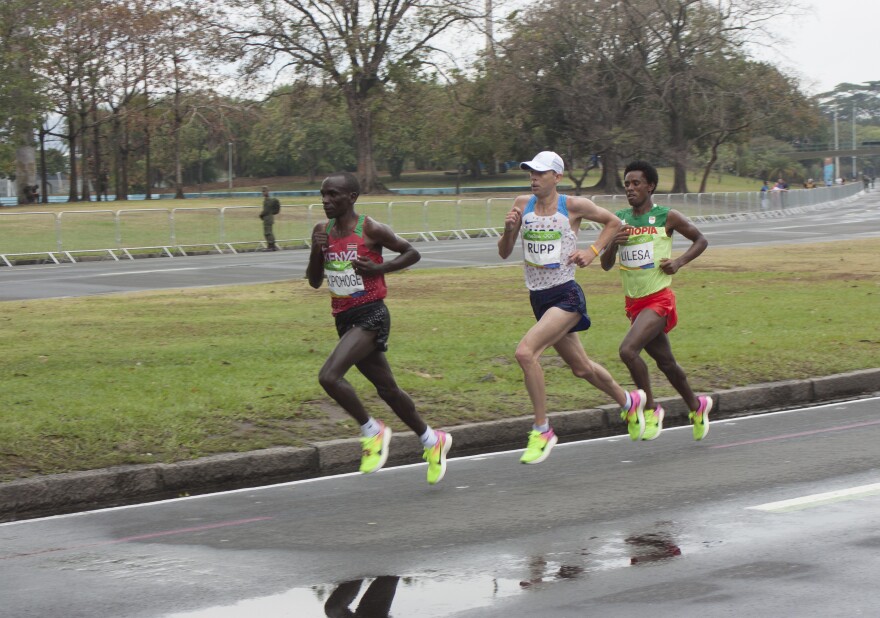
Age Is Just A Number For Some Elite Marathoners At World Track & Field Championships In Eugene
Listen
(Runtime 4:07)
Read
An elite field featuring most of the world’s best marathoners has arrived in Oregon for this year’s World Track and Field Championships. Competitors from 34 countries will race through the streets of Eugene and neighboring Springfield this coming Sunday morning for the men and Monday for the women. Some of the marathoners are trying to outrun both their rivals and Father Time.
Now, running at top speed for a long distance may seem like a pastime for the young — and it is. But some of the top marathoners on Team USA and on foreign teams toeing the start line Eugene are surprisingly old, relatively speaking.
The oldest man in the field is 43-year-old Brazilian Olympian Paulo Paula. The oldest woman is 42-year-old Hanna Lindholm of Sweden.
American contender Sara Hall clocks in at a spry 39. She said she’s surprised she is “able to keep progressing” at this age.
“That was never the plan to do this career this long,” Hall said. “But through my training, I’ve continued to see a lot of improvement. That has just led me to dream bigger for the races.”
Hall chatted during a cool down from a training run in Colorado ahead of her trip to Eugene. She remembered a pertinent line from a former coach: “Once you start saying you’re old, you start the clock.”
“I think I’ve tried to just be really careful of that in my career — to just expect myself to keep improving and not expect myself to slow down,” Hall continued. “It hasn’t been without a ton of work to be able to keep improving at this age. To keep my body in one piece takes a lot of effort. It takes a lot of time with gifted therapists.”
Hall’s teammates on the men’s side include Army lieutenant Elkanah Kibet. He is also 39 years old. And there’s four-time Olympian Galen Rupp of Portland, age 36.
“Especially as I’ve gotten older, I still believe that I can run a lot faster in a marathon than I have. And I think that idea of constantly seeing how far I can take my body and my mind and putting it together in one performance is the biggest driving thing for me right now,” Rupp told CBS in March.
Rupp achieved his personal best of 2:06:07 while winning the Prague Marathon in 2018.
Researchers in the Pacific Northwest and beyond have studied how age affects peak athletic performance. Damien Callahan, an assistant professor in human physiology at the University of Oregon, said those accumulating birthdays become less of a factor as the distance of a race increases.
“As much as these athletes are older with respect to what most folks consider peak performance, which is generally mid-twenties, there is a long plateau that follows that phase where age-related changes and ability to perform maximally isn’t really felt until mid to even late 30s,” Callahan said in an interview.
The ages of the athletes who qualified in the sprints versus the marathon at the Oregon22 world championships illustrate a point. The average age of the 100-meter sprinters is 25 years old. The average marathoner is 31, male or female.
“Sprint performance is based almost purely on muscle power and the ability to exert that power, produce that power over exceedingly short periods of time,” Callahan said.
Muscle strength peaks around age 25, according to multiple studies the researcher shared. Father Time is more forgiving to endurance runners in the 5,000 meters, 10 kilometers, marathon and on up. Callahan said that’s because more parts of our bodies contribute to peak performance over that range, such as heart, lungs and fuel delivery. Some of those body systems age slower than raw muscle power.
“Cardiovascular changes that may occur later, in your 40s for example, help maintain marathon performance to a little bit later. It kind of pushes the goal posts a little further out,” Callahan said.
Callahan said the studies of elite athletes and the limits of human performance have relevance for the rest of us. He is currently looking at muscle power and fatigue resistance in top collegiate athletes to gain insights into mechanisms down to the cellular and molecular level that affect whole body performance. The researcher hopes to carry over this understanding to fight age-related physical decline of seniors in their 70s and 80s.
Meanwhile, the race favorites in Sunday’s and Monday’s marathons look to be the usual suspects from traditional distance running powers Kenya, Ethiopia and Uganda. The veteran Rupp appears to be the best hope for the Americans to get on the podium. To be competitive, Rupp will need to move beyond his rocky spring season, which included a mild case of COVID-19 in June and a herniated disc and pinched nerve that contributed to poor performances during two races in March.
The reigning Olympic champion and current marathon world record holder Eliud Kipchoge of Kenya is skipping this weekend’s Eugene race to instead focus on the big money, faster course Berlin Marathon this fall. Kipchoge is still going strong at age 37, by the way. Women’s Olympic marathon champion Peres Jepchirchir, 28, also of Kenya, recently pulled out of the world championships in Oregon due to a right hip injury.















